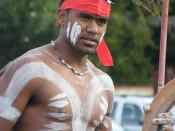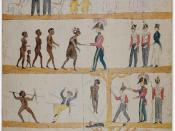Histories of early relations between Aborigines and European settlers are rife with bias. Many primary sources from the era are inaccurate, the truth being omitted for political and social agendas. In particular, the Frontier Warfare aspect has been minimised in mainstream histories, particularly between the pastoralists and the tribes of Tasmania, and more recently in the accounts of Australian historian, Keith Windschuttle. This is to perpetuate the myth of helplessness and inferiority of the Aboriginal race. Many have seen the proclamation of war by Governor Arthur and the subsequent removal of all surviving Tasmanian Aborigines to a reservation, as the genocide of an ancient race, though there are some who choose to deny of any form of frontier warfare, thoroughly disputed by modern Aborigines and well-renowned writers and historians. It is clear to see that while mainstream society has for a long time dismissed frontier warfare as untrue, it did indeed occur and slowly, is being accepted by all but a few as the true version of Australian history.
The issue of Frontier Warfare began with the invasion and outward spread of European settlers, the proclamation of Terra Nullius further stripping Aborigines of any land rights. From 1788 to 1900 there were many bad relations between settlers and Aborigines. A source adapted from Six Australian Battlefields shows the relationship the Aborigines had with the land.
The spirits gave Black Australians their land. Land could not be bought, sold or taken in fights. The land belonged to the people and the people belong to the land forever. (Grassby, A. and Hill, M., 1988, p2.)
In this source it is clear that the Aborigines saw themselves as owners of the land, and that the declaration of Terra Nullius was false. However this was inconvenient for the European settlers, so they declared...


